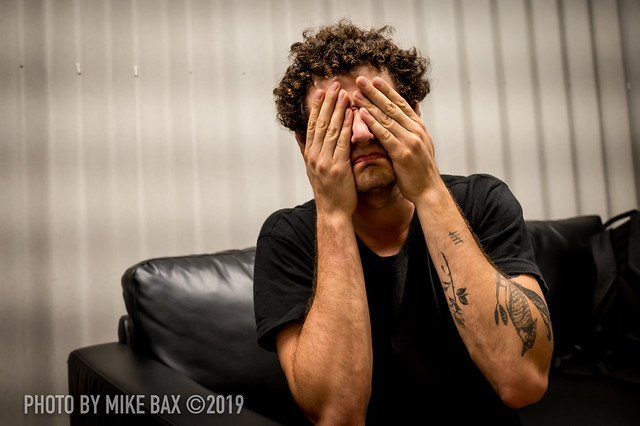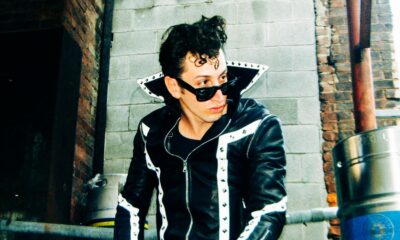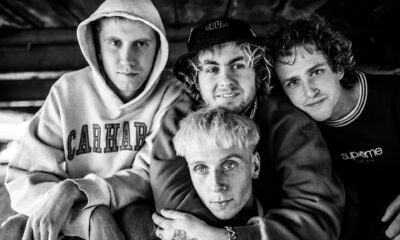Interviews
GRANDSON Discusses Gun Control, Navigating the Music Industry, LSD, and Full-Length Albums [w/ Audio]
grandson, is a Canadian-American musician currently signed to Fueled by Ramen. Mike Bax spoke with him about teaching, the increase in gun violence, and the artist circumventing the traditional music model.
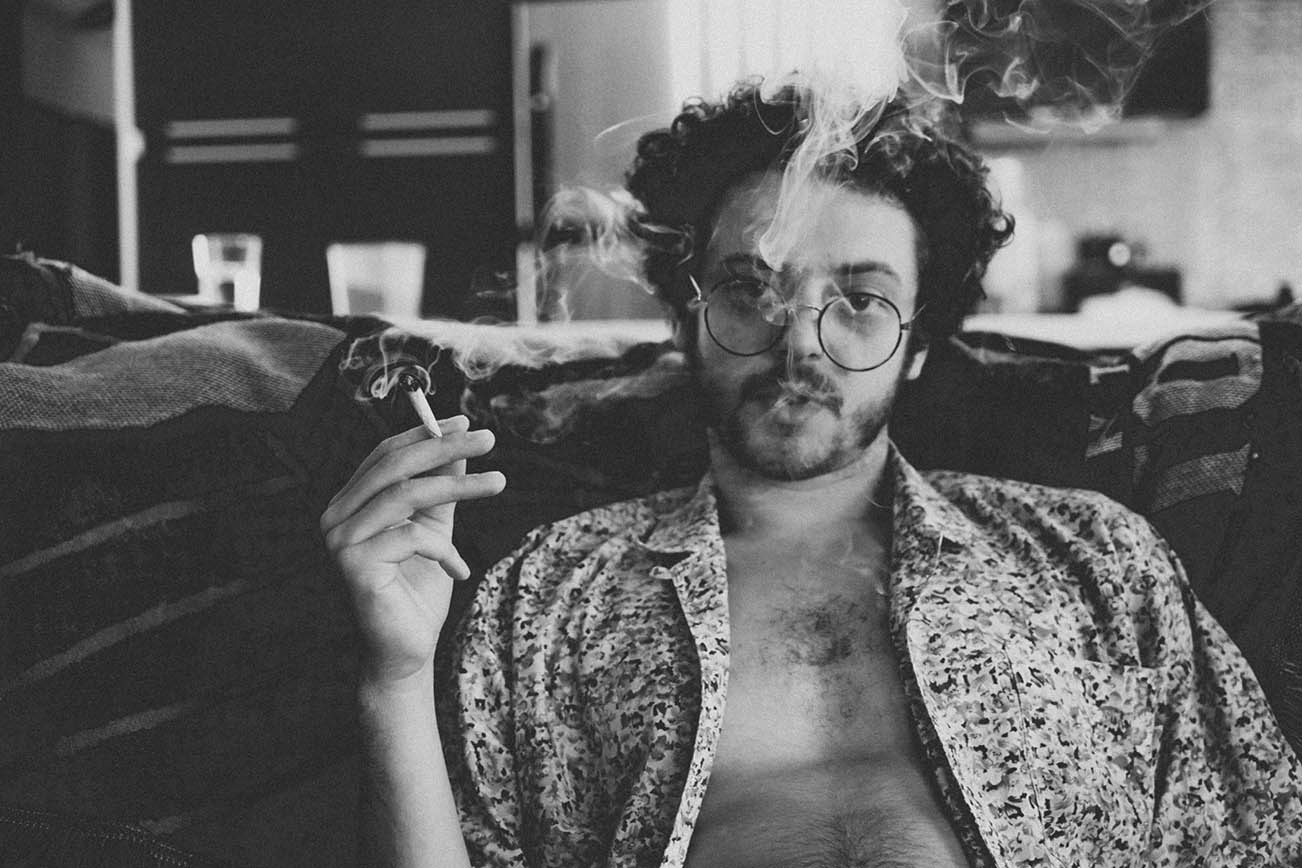
Jordan Edward Benjamin, professionally known as grandson, is a Canadian-American singer, songwriter, and musician currently signed to Fueled by Ramen. He released his major-label debut EP, A Modern Tragedy Vol. 1, on June 15th, 2018, and released the follow-up, A Modern Tragedy Vol. 2, on February 22nd, 2019. In September 2019, Benjamin released A Modern Tragedy Vol. 3, the final instalment of his Modern Tragedy trilogy of EPs. The initial EP featured the single, “Blood // Water,” which appeared on several Billboard charts in both the United States and Canada. Benjamin’s music tends to focus on modern-day issues, many of which are less recognized by the media.
grandson has just announced an eight-date Canadian tour in March of 2020 that pushes from Victoria, British Columbia to Toronto, and Montreal over two weeks. These shows are all on sale now. The Toronto date occurs March 28th at Danforth Music Hall, and the Montreal show happens two days later at Club Soda. Benjamin is one of the most exciting up and coming artists on the North American music scene at the moment. A grandson live performance is something genuinely transcendental to behold. Get into a club and see grandson live in 2020 before he blows up into 5,000-8,000 capacity theatres and arenas.
grandson has toured with acts like Hobo Johnson, Joywave, Nothing But Thieves, Smashing Pumpkins, and Young the Giant. A few months back, grandson performed in Toronto at Echo Beach with Sum 41, and we spent about fifteen minutes chatting with him about a few things backstage. Benjamin is an articulate speaker, eager to talk about his craft. We got through less than a quarter of the questions we had prepared for him during this interview, and could easily have spent another half hour going deeper. Another time, perhaps. This interview took place the weekend after Osheaga Festival in Montreal, where Benjamin performed a magical set to a “hometown” crowd.
Off his latest EP A Modern Tragedy Vol. 3 watch Grandson’s newest music video for “Oh No!!!”
Maybe let’s start with a recap of last weekend. You played Osheaga. What was that like for you being back in Montreal?
Jordan Benjamin: “It was amazing. It was cool for me on a lot of levels. I did that festival as an audience member for the first time in 2012-13. I was just in my second year of college. I had just started writing music, and I went with my family. I convinced the job I had been working to give me the weekend off for a ’quote-unquote’ family trip that we do every year. I went for the first time with my family. I somehow got a tab of acid; I don’t know how. But it was the most eye-opening experience for me just on the connectivity of everyone there being there for the same reasons connected through what music means to them and how much it meant to me. And how it brought me so much closer to my family and my friends.
The artists were important, but they were just a vessel for me to discover that about myself about my relationship to music. And it didn’t even occur to me; I wasn’t even like, ’wow, I hope one day I can get up there.’ It didn’t even go that deep, you know? At that point, it was just such a hobby for me. So to be able to find myself standing up there (on stage) and recognizing that just a couple of little things going one way or another, and I’m down there looking up instead of up there looking down. That was just a really easy thing to celebrate. And it was super fun, and there were thousands of kids moshing out. What more could you ask for? And we were on zero sleep, and it was crazy.”
And you dropped LSD with your parents.
Benjamin: (laughs) “No. Not with my parents, but with my siblings.”
Some candid images of grandson at Echo Beach (Toronto, Ontario) on August 8, 2019, by Mike Bax:
Ohh! Your siblings! I wouldn’t even do that, man.
Benjamin: “I’m pretty lucky. I’ve got a pretty cool family.”
Do you think you’ll ever fall back towards your original pursuit of teaching? Like, maybe even down the road? Was it something that you really wanted to do and could maybe even see yourself teaching music?
Benjamin: “That’s a good question. I think that I, in some ways, get to scratch that itch. I get to talk to young people. I get to advocate on behalf of them and use my time in class (on stage, you know) to impart some sort of message of agency or empowerment. But to be honest, when I first started pursuing education at McGill (University), it wasn’t really like I had this very clear vision I wanted to be a teacher. It was rather just a vehicle for me to; a. live in Montreal and b. not have to ask myself what am I going to do when I grow up. It just became this thing that I think a lot of kids in Canada and America fall into, which is, ‘what do you do after school? You go to school.’
So for me. I had applied for a bunch of different programs across Canada, and the McGill Education program was the only program I got into at McGill. And I said, ‘you know I’m going give this a shot,’ because I knew I wanted to live there. Both my siblings had. And I was dead-on about Montreal. I still have so much love for that city, and it’s helped shape me into who I am. But as I found myself sitting in a classroom and trying to take notes, I remember asking a teacher how long they had been at the school. And she said that she’d been in that very classroom for seventeen years or something like that.
And I think that for me was a sign. I didn’t know exactly what was going to get me, but I knew I wanted to run. So I think that maybe if I throw a couple more laps around the world, it’ll bring me to a place of feeling more interested in settling down and digging in. And then being able to work in some way with young people and advocate for all that I’ve had to learn the hard way in the music industry. That would be a cool way the way for the path to go. Who knows. Anything could happen.”
Grandson’s latest A Modern Tragedy Vol. 3 was released September 13th, 2019 via Fueled By Ramen:
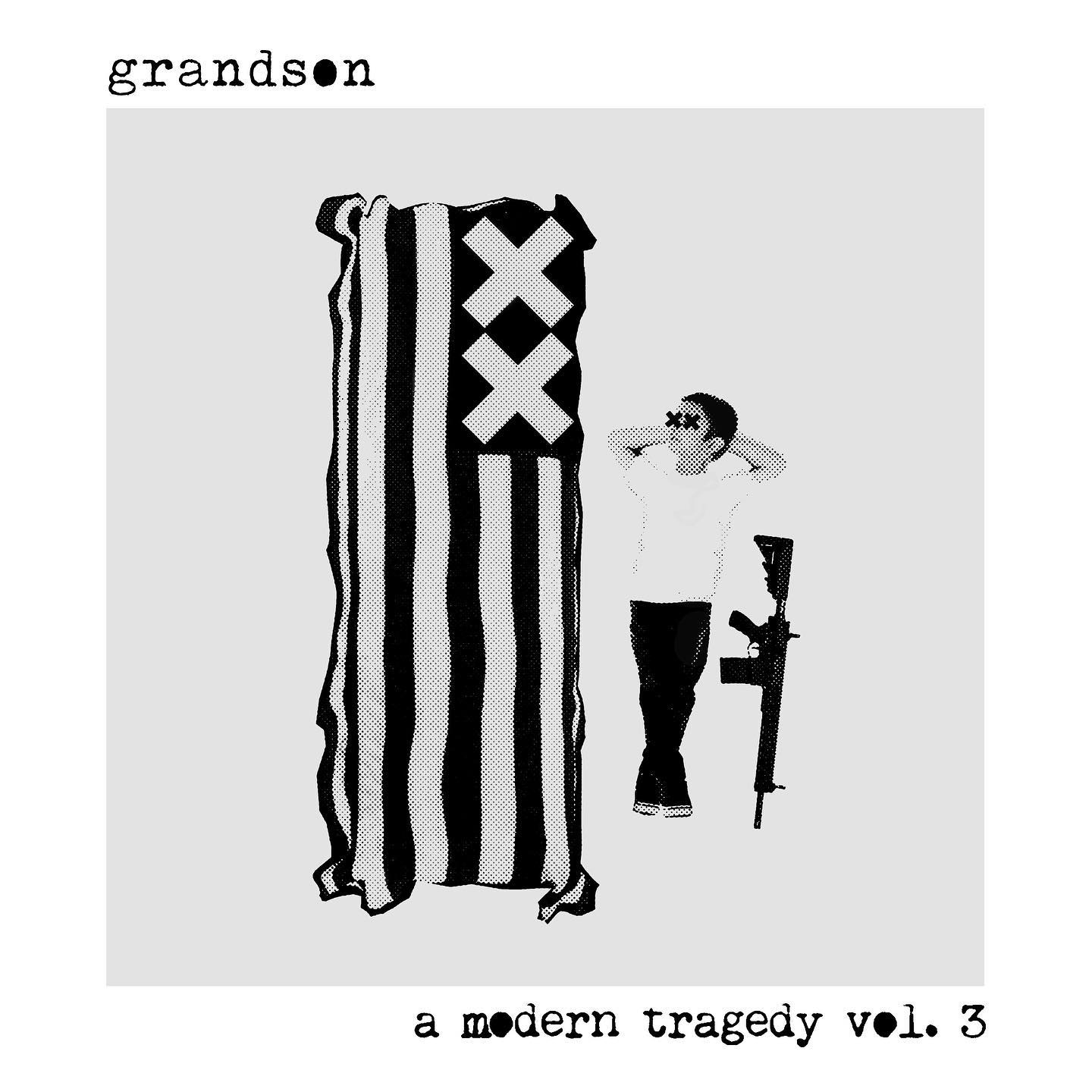
I know you’ve spoken out about gun violence in the past. How did this past weekend make you feel? Two massacres in the States and seventeen people shot in Toronto (Ontario Civic Holiday Weekend). What the fuck?!
Benjamin: “Yeah dude. What the fuck? I know. It’s disheartening. I try and do this thing where I try to throw my cup of water on the forest fire. That’s kind of the analogy that I look at; what we’re facing in this generation. Some people are dedicating their time and dedicate their lives to trying to be a part of the solution and not the problem. Organizations like Every Town and March For Our Lives. And I try and defer to them. I try to use this microphone as a megaphone for those organizations and those people. But by speaking up, we’ve received a ton of backlash from people telling me I don’t know what I’m talking about.
Through touring, we dipped down into Florida, and I got to meet first responders, EMS professionals, teachers, and classmates. Fans have reached out whose little brother or friends were, unfortunately, a casualty or were injured. All we can do is what we can do, and that’s advocate. That, and get mad. And in America, there are just these glaring loopholes as to how people can obtain these guns and the capacities to which you can prepare yourself if you set out to shoot a lot of people in not a lot of time.
Is closing those loopholes and limiting those kinds of magazines going to make it so that nobody is a victim of a senseless crime? Of course not. What’s lost in this rhetoric of going back and forth forever about, ’maybe we should do this or maybe we should do that,’ is we’ve got to try something. And if this doesn’t work, we’ll try something else. And I really do think that it has been a deliberate, methodical process of blocking any sort of reform. And the people who are receiving money for their participation in that blocking, that bottlenecking of progress should be held accountable in one way or another. And it sucks.”
Also from A Modern Tragedy Vol. 3, this is the music video for “Rock Bottom:”
Can you talk a little bit about the music model that is currently at your disposal as a young musician. I mean, I’m 52. So, to me, bands signed with a major label, they’d go out on the road, they might sell a few t-shirts. Then repeat. You’ve managed to en masse a pretty significant amount of following without having to really utilize any of that. Have you thought about that much?
Benjamin: “Yeah. I’m really enjoying this. This is a fucking really refreshing conversation. I think that there’s kind of two sides to it, in which there is unprecedented accessibility for musicians to both be able to record their music and get it out. And for fans to connect with bands and with the artists that they love. When my dad was a musician, his whole life revolved around finding ways to record his music for as cheap as possible. He would move across America if he had some vague connection to recording a demo. And we recorded our biggest song ’Blood Water’ on a 30 dollar microphone in my living room. So because of that, there is an unprecedented amount of leverage that having success provides.
But there’s also unprecedented oversaturation. And competition for people’s attention for their 20 dollars for a ticket sale, or what have you. The analogy that I use is; I think that I used to look at a label as starting a fire. I don’t know what I’m doing, but hopefully, if I signed with a record label, they’ll show me what to do. And I think a better way to frame the relationship of an artist to a label now is, I can start a fire. And then I can enlist some help to pour some gasoline on it. At the beginning, you need the kindling. You need to just throw content at it. And once we put out the first song we put out, I think six songs every six weeks or something like that. We didn’t go longer than a month with people’s attention wavering. We just kept an onslaught of material coming until one kind of took off.
I still needed to rely on my manager, who paid at one point when I was dropped, and I was independent. I still needed to find 30-40 grand. There’s still not a way around that part. And I think a lot of independent artists or the backlash against record labels kind of diminishes that. I still needed to pay for music videos and pay for independent promotion. We paid for an independent radio promo team to push my song ’Blood Water’ here in Canada. We paid to be able to fly my band at a loss to play a couple of festivals we had agreed to play. All just to drive the perception of momentum for these record labels so that when the right partner came knocking, we were able to send a clear message that I knew exactly who my audience was and the language in which I speak with them. And I was able to effectively convince the people that were in charge that this was going to happen one way or another, whether it was with them or somebody else. And because of that, we were able to work out a situation that worked for everybody.
But I am a major label artist. I am signed to a record label, and they play a huge part in me getting on opportunities like this and getting my songs on Canadian radio. So I do think that it’s a new era. I do think there are still parts of the music industry where an artist and their management have to be savvy and have to be entrepreneurial and forward-thinking. But there are still barriers to access that have to do with privilege and whether you can get your family or friend to loan you that money, or have a manager who can put it up; or have to sign with some sort of distribution deal to get that dough. There are still obstacles. Maybe it’s naive, or I’m blindly optimistic, but I do believe if you make good music and you’re speaking from a place of honesty and authenticity, then it’s going to happen. It has to. There are lots and lots of cases where that’s inaccurate. You know, lots of successful people that don’t have a message. And lots of people making good music with a message who are falling on deaf ears. So I’m just really really lucky to be on this side of it.”
From A Modern Tragedy Vol. 2 check out the music video for the hit song “Apologize:”
Do you have any desire to make a full-length album? Like a physical LP, and have that monument to put forward and reflect upon?
Benjamin: “I do. I think that we will. I think that I will. I’ve got a couple of different projects in my head kind of percolating. One is a more conceptual piece. But I love making songs. I just love tackling it one song at a time. And the way that our process works. A lot of the time, one song might be cannibalizing five different rough ideas. And because of that, it feels like whenever we put out a song, it feels like our greatest hits for me. Because it is the standing on the bones of these old voice notes that I’ve been compiling for a couple of months. So whether we take ten of them and call it an album or take five of them and call it an EP, I certainly wasn’t in a rush to put out a body of work that nobody was going to have the patience or the interest in listening to.
I think that finally, people are starting to knock on the door and want more. And they want to know me better and get to know this project. Which is exciting. And as that grows, then we’ll find a way to defeat it. But in my (label) relationship, it’s not like I have this (mimes holding an LP) ’oh wow’ drive. Because so few people are going to even hold it. It’s so different, you know? But I do think that for a young artist I think that our map model of doing singles until you get a little bit of traction, and then putting out a series of EPs, and eventually escalate that into a full-length? I think that that’s the way that music is moving.”
Have you talked to other songwriters? Do you feel like you create music the same way that everybody else creates music or do you feel like you have a sort of an exclusive way of coming up with stuff?
Benjamin: “I think that everybody does it. I feel like people do it differently, but there are only so many ways to do it. I think that some people are very introverted, and some people favour collaboration. I think that for some people it happens immediately with this one bout of mad inspiration. And I lean on other songwriters and artists more for the perspective that they can give me on the ups and downs of touring and setting boundaries with fans. There are certain components to being a touring musician that nobody can really plan for. And in those moments having somebody like Deryck (Whibley) here at Sum 41 as well as Mike Shinoda at Linkin Park and Tom Morello.
I’ve been able to have a couple of my Mount Rushmore figureheads be able to come to life and impart a little bit of wisdom and perspective on me. And that helps because there’s no manual. There’s not really an HR department, you know? So there are times where it can be pretty confusing. And I’m lucky to lean on my community, and lean on the dudes I tour with when I’m low and lean on my manager and ask for help when I need it.”
-

 Music5 days ago
Music5 days agoTake That (w/ Olly Murs) Kick Off Four-Night Leeds Stint with Hit-Laden Spectacular [Photos]
-

 Alternative/Rock6 days ago
Alternative/Rock6 days agoThe V13 Fix #010 w/ High on Fire, NOFX, My Dying Bride and more
-

 Hardcore/Punk2 weeks ago
Hardcore/Punk2 weeks agoHastings Beat Punks Kid Kapichi Vent Their Frustrations at Leeds Beckett University [Photos]
-

 Alternative/Rock2 weeks ago
Alternative/Rock2 weeks agoA Rejuvenated Dream State are ‘Still Dreaming’ as They Bounce Into Manchester YES [Photos]
-

 Features5 days ago
Features5 days agoTour Diary: Gen & The Degenerates Party Their Way Across America
-

 Culture1 week ago
Culture1 week agoDan Carter & George Miller Chat Foodinati Live, Heavy Metal Charities and Pre-Gig Meals
-

 Music7 days ago
Music7 days agoReclusive Producer Stumbleine Premieres Beat-Driven New Single “Cinderhaze”
-

 Alternative/Rock1 week ago
Alternative/Rock1 week agoThree Lefts and a Right Premiere Their Guitar-Driven Single “Lovulator”

